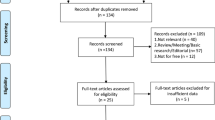Abstract
Background
Survival rates after resection of pancreatic adenocarcinoma are poor; however, several tumor-related prognostic factors have been identified. There is increasing evidence that additional patient-related prognostic factors, such as ongoing systemic inflammatory response, are associated with poor outcomes in patients with common solid tumors. The purpose of this study was to evaluate the prognostic significance of the modified glasgow prognostic score (mGPS) in resected pancreatic ductal adenocarcinoma.
Methods
Data were collected from 101 patients who had undergone pancreatic resection for ductal adenocarcinoma. Tumor and host factors were analyzed by Kaplan–Meier and Cox proportional hazard models to evaluate their potential prognostic effects.
Results
An elevated mGPS was associated with lower overall survival rate after pancreatic resection. The median actuarial survival rate for patients with an mGPS of 0, 1, or 2 was 37.2, 11.5, and 7.3, respectively (p = 0.0001). The Cox proportional hazards model, including all the parameters statistically significant at univariate analysis, demonstrated that mGPS, lymph node ratio (LNR), and positive resection margins were independent negative prognostic factors
Conclusions
Margin involvement, LNR, and the preoperative mGPS were identified as independent predictors of survival in patients undergoing potentially curative pancreatic resection. Based on the present results and existing validation literature, the mGPS should be included in the routine assessment of patients with pancreatic cancer to better stratify patients for entry into therapeutic trials.


Similar content being viewed by others
References
AIRTUM Working Group. Cancer incidence and mortality trends of the Italian Network of Cancer Registries (AIRTUM), 1998–2005. http://www.registri-tumori.it/cms/?q=Doc2009 Rivista dell’Associazione Italiana di Epidemiologia 2009.
Winter JM, Cameron JL, Campbell KA, et al. 1423 pancreaticoduodenectomies for pancreatic cancer: a single institution experience. J Gastrointest Surg. 2006;10:1199–210.
Brennan MF, Kattan MW, Klimstra D, et al. Prognostic nomogram for patients undergoing resection for adenocarcinoma of the pancreas. Ann Surg. 2004;240:293–8.
La Torre M, Cavallini M, Ramacciato G, Cosenza G, Del Monte SR, Nigri G, Ferri M, Mercantini P, Ziparo V. Role of the lymph node ratio in pancreatic ductal adenocarcinoma. Impact on patient stratification and prognosis. J Surg Oncol. 2011;104(6):629–33.
Colotta F, Allavena P, Sica A, et al. Cancer-related inflammation, the seventh hallmark of cancer: links to genetic instability. Carcinogenesis. 2009;30:1073–81.
Vakkila J, Lotze MT. Inflammation and necrosis promote tumour growth. Nat Rev Immunol. 2004;4:641–8.
Roxburgh CS, McMillan DC. Role of systemic inflammatory response in predicting survival in patients with primary operable cancer. Future Oncol. 2010;6:149–63.
Forrest LM, McMillan DC, McArdle CS, et al. Comparison of an inflammation-based prognostic score (GPS) with performance status (ECOG) in patients receiving platinum-based chemotherapy for inoperable non-small-cell lung cancer. Br J Cancer. 2004;90:1704–6.
Gabay C, Kushner I. Acute-phase proteins and other systemic responses to inflammation. N Engl J Med. 1999;340:448–54.
McMillan DC, Elahi MM, Sattar N, et al. Measurement of the systemic inflammatory response predicts cancer-specific and non-cancer survival in patients with cancer. Nutr Cancer. 2001;41:64–9.
Glen P, Jamieson NB, McMillan DC, et al. Evaluation of an inflammation-based prognostic score in patients with inoperable pancreatic cancer. Pancreatology. 2006;6:450-3.
Al Murri AM, Bartlett JM, Canney PA, et al. Evaluation of an inflammation-based prognostic score (GPS) in patients with metastatic breast cancer. Br J Cancer. 2006;94:227–30.
Jamieson NB, Denley SM, Logue J, et al. A prospective comparison of the prognostic value of tumor- and patient-related factors in patients undergoing potentially curative surgery for pancreatic ductal adenocarcinoma. Ann Surg Oncol. 2011;18(8):2318–28.
Sobin LH, Wittekind C. TNM classification of malignant tumours (UICC). 6th ed. New York: John Wiley & Sons; 2002.
Slidell MB, Chang DC, Cameron JL, et al. Impact of total lymph node count and lymph node ratio on staging and survival after pancreatectomy for pancreatic adenocarcinoma: a large, population-based analysis. Ann Surg Oncol. 2008;15(1):165–74.
Kaplan EL, Meier P. Nonparametric estimation from incomplete observations. J Am Stat Assoc. 1958;53:457–81.
Mantel N. Evaluation of survival data and two new rank order statistics arising in its consideration. Cancer Chemother Rep. 1966;50:163–70.
Roxburgh CS, McMillan DC. Role of systemic inflammatory response in predicting survival in patients with primary operable cancer. Future Oncol. 2010;6:149–63.
Nozoe T, Korenaga D, Futatsugi M, et al. Immunohistochemical expression of C-reactive protein in squamous cell carcinoma of the esophagus: significance as a tumor marker. Cancer Lett. 2003;192:89–95.
Du Clos TW. Function of C-reactive protein. Ann Med 2000;32:274–8.
Legouffe E, Rodriguez C, Picot MC, et al. C-reactive protein serum level is a valuable and simple prognostic marker in non Hodgkin’s lymphoma. Leuk Lymphoma. 1998;31:351–7.
Crumley AB, Stuart RC, McKernan M, et al. Is hypoalbuminemia an independent prognostic factor in patients with gastric cancer? World J Surg. 2010;34:2393–8.
Lien YC, Hsieh CC, Wu YC, et al. Preoperative serum albumin level is a prognostic indicator for adenocarcinoma of the gastric cardia. J Gastrointest Surg. 2004;8:1041–8.
Jamieson NB, Glen P, McMillan DC, et al. Systemic inflammatory response predicts outcome in patients undergoing resection for ductal adenocarcinoma head of pancreas. Br J Cancer. 2005;92(1):21–3.
Smith RA, Dajani K, Dodd S, et al. Preoperative resolution of jaundice following biliary stenting predicts more favourable early survival in resected pancreatic ductal adenocarcinoma. Ann Surg Oncol. 2008;15:3138–46.
Canna K, McMillan DC, McKee RF, et al. Evaluation of a cumulative prognostic score based on the systemic inflammatory response in patients undergoing potentially curative surgery for colorectal cancer. Br J Cancer. 2004;90:1707–9.
Ikeda M, Natsugoe S, Ueno S, et al. Significant host- and tumor-related factors for predicting prognosis in patients with esophageal carcinoma. Ann Surg. 2003;238:197–202.
Acknowledgement
Marco La Torre is supported by the PhD University Grant program “Clinical and Experimental Research Methodologies in Oncology” provided by the Faculty of Medicine and Psychology, University of Rome “La Sapienza”, Rome, Italy.
Competing interests
The authors declare no potential financial conflict of interest related to this manuscript.
Author information
Authors and Affiliations
Corresponding author
Rights and permissions
About this article
Cite this article
La Torre, M., Nigri, G., Cavallini, M. et al. The Glasgow Prognostic Score as a Predictor of Survival in Patients with Potentially Resectable Pancreatic Adenocarcinoma. Ann Surg Oncol 19, 2917–2923 (2012). https://doi.org/10.1245/s10434-012-2348-9
Received:
Published:
Issue Date:
DOI: https://doi.org/10.1245/s10434-012-2348-9




